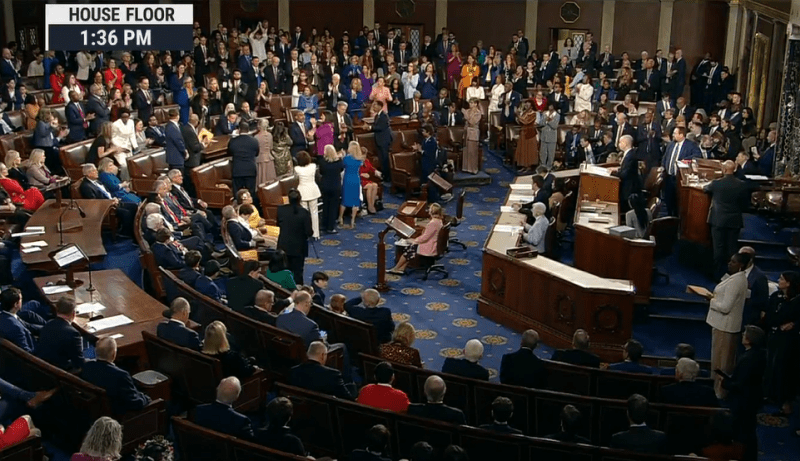
In a bold move on the House floor Friday, V.I. Delegate Stacey Plaskett issued a parliamentary inquiry challenging the exclusion of U.S. territories from voting in the Speaker of the House election – an intervention that highlighted the longstanding disenfranchisement of approximately four million Americans residing in territories like the U.S. Virgin Islands, Puerto Rico, Guam, American Samoa and the Northern Mariana Islands.
“I rise because my name or the names of the five representatives of the territories duly elected by collectively four million Americans, our names were not called,” Plaskett asserted during the session. “And I ask parliamentary inquiry as to why not at this time, at this juncture in the United States, that the territories do not have a voice on this floor?”
Following her floor remarks, Plaskett spoke with the Source, detailing the strategic planning behind her inquiry. “Just knowing the House rules, I know that you can make a parliamentary inquiry,” she explained. She consulted with House Minority Leader Hakeem Jeffries, who supported her initiative. After coordinating with his staff and notifying the Speaker pro tempore and the parliamentarian to ensure they were prepared, she seized the moment post-vote. “I waited until all the votes were done to make a parliamentary inquiry according to the House rules,” she noted.
Plaskett’s advocacy for territorial rights has spanned a decade, encompassing legislative efforts, bill requests and committee hearings aimed at securing equitable treatment for territories. She recounted spontaneously drafting her remarks on Thursday with input from fellow lawmakers. “Literally, as we were working on the votes, I was sitting next to Jesse Jackson’s son, Jonathan Jackson, who handed me a blank note card, where I scribbled some thoughts – and when the votes were over, I just stood up and spoke,” she recalled.
Her fiery address appeared to garner support across party lines. While many Democrats applauded her, Plaskett shared several Republicans also expressed agreement. “Particularly when I shared the number of veterans in the territories, one Republican member said, ‘This reminds me of when African Americans fought in World War I and World War II and then came back home and couldn’t vote. That appears to be what’s happening to you all, and that’s not right.’”
Plaskett stressed the importance of persistent education and advocacy to dismantle the longstanding inequities. “I think all of us have an obligation to continue to point out wrongs, to express them, and to, in a logical, non-confrontational manner, discuss what we’re facing,” she said. “Many people are not even aware of these issues happening in the territories. Eventually, we’ll get there if we’re all pushing and not accepting the status quo.”
Her concerns, though, extend beyond voting rights. In a brief exchange with Speaker Mike Johnson, Plaskett highlighted her broader apprehensions. “I said it’s a very precious and important issue, and I hope I can get your support on this,” she recounted. Plaskett also flagged potential threats to civil rights and social programs, including Social Security, food security initiatives, and affordable medicine. “These are things we’re all concerned about that may be on the chopping block in this Congress, and I’m going to be keeping an eye out.”





